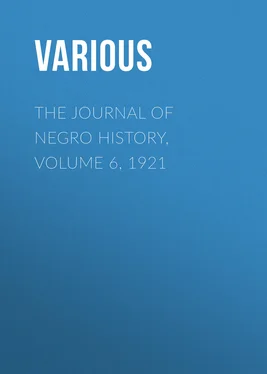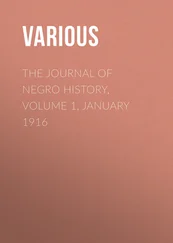Various - The Journal of Negro History, Volume 6, 1921
Здесь есть возможность читать онлайн «Various - The Journal of Negro History, Volume 6, 1921» — ознакомительный отрывок электронной книги совершенно бесплатно, а после прочтения отрывка купить полную версию. В некоторых случаях можно слушать аудио, скачать через торрент в формате fb2 и присутствует краткое содержание. Жанр: foreign_antique, periodic, История, foreign_edu, на английском языке. Описание произведения, (предисловие) а так же отзывы посетителей доступны на портале библиотеки ЛибКат.
- Название:The Journal of Negro History, Volume 6, 1921
- Автор:
- Жанр:
- Год:неизвестен
- ISBN:нет данных
- Рейтинг книги:4 / 5. Голосов: 1
-
Избранное:Добавить в избранное
- Отзывы:
-
Ваша оценка:
- 80
- 1
- 2
- 3
- 4
- 5
The Journal of Negro History, Volume 6, 1921: краткое содержание, описание и аннотация
Предлагаем к чтению аннотацию, описание, краткое содержание или предисловие (зависит от того, что написал сам автор книги «The Journal of Negro History, Volume 6, 1921»). Если вы не нашли необходимую информацию о книге — напишите в комментариях, мы постараемся отыскать её.
The Journal of Negro History, Volume 6, 1921 — читать онлайн ознакомительный отрывок
Ниже представлен текст книги, разбитый по страницам. Система сохранения места последней прочитанной страницы, позволяет с удобством читать онлайн бесплатно книгу «The Journal of Negro History, Volume 6, 1921», без необходимости каждый раз заново искать на чём Вы остановились. Поставьте закладку, и сможете в любой момент перейти на страницу, на которой закончили чтение.
Интервал:
Закладка:
Feeling that its charter was violated by this law and also that it infringed upon the rights guaranteed the Negro in the Constitution of the United States, Berea College attacked the validity of this measure in the inferior courts and finally in the Supreme Court of the United States. The plaintiff unanswerably contended that this Kentucky law abridged one's privileges and immunities, in violation of the Fourteenth Amendment of the Constitution of the United States, which was a limitation on the police power of the State when it brings in the matter of race. It further contended that the Constitution makes no distinction between races and that the Fourteenth Amendment is not only to protect Negroes but to protect white persons in the enjoyment of their rights. The plaintiff admitted that social equality could not be enforced by legislation but contended that voluntary social equality of persons cannot be constitutionally prohibited, unless it is shown that such is immoral, disorderly, or for some other reason so palpably injurious to the public welfare as to justify direct interference with the personal liberty of the citizens.
Evidently wishing to find some ground upon which it could base its opinion upholding the Supreme Court of Kentucky which had sustained this statute, the Supreme Court of the United States fell back upon various principles of interpretation. The court said it would not disturb the judgment of the State court resting on Federal or non-Federal grounds, if the latter was sufficient to sustain the decision in as much as the State court determines the extent of the limitations of powers conferred by the State on its corporations. It directed attention to the fact that a corporation is not entitled to all the immunities to which individuals are entitled and a State may withhold from its corporations privileges and powers of which it cannot constitutionally deprive individuals. A State statute limiting the powers of corporations and individuals may be constitutional as to the former, although unconstitutional as to the latter; and if separable it will not be held unconstitutional in the instance of a corporation unless it clearly appears that the legislature would not have enacted it as to corporations separately. "The same rule," continues the court, "which permits separable sections of a statute to be declared unconstitutional without rendering the entire statute void applies to separable provisions of a section of a statute. In coming to the assistance of the Supreme Court of Kentucky the national tribunal said the prohibition of Kentucky against persons and corporations maintaining schools for both white persons and Negroes is separable and, even if an unconstitutional restraint as to individuals, is not unconstitutional as to corporations, it being within the power of the State to determine the powers conferred upon its corporations.
The court conceded that the reserve power to alter, or amend charters is subject to reasonable limitations but insisted that the Kentucky law includes no alteration or amendment which defeats or substantially impairs the object of the grant of vested rights. The court then went almost out of its way to say that "a general statute which in effect alters or amends a charter is to be construed as an amendment for all even if not in terms so designated. The court conceded that a statute which permits the education of both whites and Negroes at the same time in different localities, although prohibiting their attendance in the same place, does not defeat the object of a grant to maintain the college for all persons and is not violative of the contract clause of the Federal Constitution, the State law having reserved the right to repeal, alter and amend charters.
Justice Harlan dissented. He referred to the fact that the court held also, in Huntington v. Werthen , 73 73 120 U. S., 102.
that if one provision of a statute be invalid the whole act will fall, where "it is evident the legislature would not have enacted one of them without the other." Harlan meant to say here that to construe this law as applying only to corporations and not to individuals would give it an interpretation that the legislature never had in mind. The intention of the State legislature was to prevent all coeducation of Negroes and whites whether it should be done by persons or corporations. The whole law, therefore, should fall. Justice Harlan conceded that a State reserved the right to repeal the charter but it was not repealed by this act. The statute did not purport even to amend the charter of any particular corporation but assumed to establish a certain rule applicable alike to all individuals, associations, or corporations that teach the white and black races together in the same institution. This decision of the United States Supreme Court was then nothing more than "fine sophistry" to sanction an arbitrary invasion of the rights of liberty and property guaranteed by the Fourteenth Amendment.
Justice Harlan contended that if the giving of instruction is not a property right, it is one's liberty. Exposing the sophistry of the court he remarked that if the schools must be subjected to such segregation, why not also the Sabbath Schools and Churches? "If States can prohibit the coeducation of the whites and blacks it may prohibit the association of the Anglo-Saxons and Latins; of the Christians and the Jews. Have we become so inoculated with prejudice of race," continued Justice Harlan, "that an American government, professedly based on the principles of freedom, and charged with the protection of all citizens alike, can make distinctions between such citizens in the matter of their voluntary meeting for innocent purposes simply because of their respective races? Further if the lower court be right, then a State may make it a crime for white and colored persons to frequent the same market places, at the same time, or appear in an assembly of citizens convened to consider questions of a public or political nature in which all citizens without regard to race, are equally interested."
The Right to Labor
Although the Negro by these various decisions of the Supreme Court of the United States had been deprived of rights essential to freedom and citizenship in matters of voting, service upon juries, education, and the use of common carriers, there remained even another right which was to be infringed upon without the hope of any redress from the United States Supreme Court. This was the right to contract, to labor. Every honest man should live by his own labor and it is a well established principle of democratic government, that in the exercise of this right the individual should be free not only from interference on the part of the government but should enjoy protection from individuals subject to the government. Because of the development of race prejudice into a flame of bitter antagonism among the laboring men during the period of commercial expansion in the United States since the Reconstruction period, the country has been all but thoroughly organized through trades unions, so as to restrict the Negro to menial service by written constitutions in keeping with the caste which has so long figured conspicuously in American institutions.
Negroes sought redress in the courts and finally in the United States Supreme Court, the best case in evidence being that of Hodges v. United States . 74 74 202 U. S., 1.
In this case came a complaint from certain Negroes in Arkansas laboring in the service of an employer according to a contract. Because of their color certain criminals in that community conspired to injure, oppress, threaten and intimidate them, resulting in the severance of their connection with this employer and the consequent economic loss resulting therefrom. The Negroes thus complaining brought this case to the United States Supreme Court contending that a remedy for this evil was to be found in the revised statutes of the United States Senate, Sections 1977, 1979, 5508, and 5510. These sections follow in the order of their importance:
Интервал:
Закладка:
Похожие книги на «The Journal of Negro History, Volume 6, 1921»
Представляем Вашему вниманию похожие книги на «The Journal of Negro History, Volume 6, 1921» списком для выбора. Мы отобрали схожую по названию и смыслу литературу в надежде предоставить читателям больше вариантов отыскать новые, интересные, ещё непрочитанные произведения.
Обсуждение, отзывы о книге «The Journal of Negro History, Volume 6, 1921» и просто собственные мнения читателей. Оставьте ваши комментарии, напишите, что Вы думаете о произведении, его смысле или главных героях. Укажите что конкретно понравилось, а что нет, и почему Вы так считаете.












